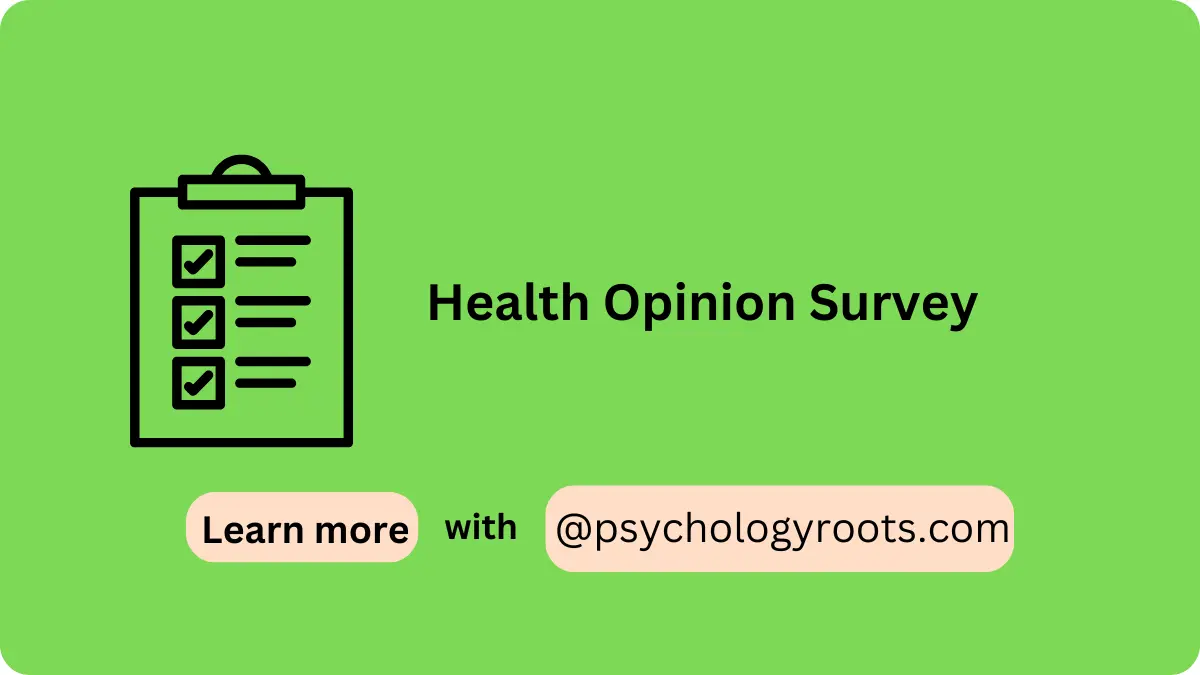Table of Contents
Health Opinion Survey
Here in this post, we are sharing the “Health Opinion Survey”. You can read psychometric and Author information. We have thousands of Scales and questionnaires in our collection (See Scales and Questionnaires). You can demand us any scale and questionnaires related to psychology through our community, and we will provide you with a short time. Keep visiting Psychology Roots.
About Health Opinion Survey
Scale Name
Health Opinion Survey
Author Details
Allister M. Macmillan
Translation Availability
English

Background/Description
The Health Opinion Survey (HOS), developed by Allister M. Macmillan in 1957, is a 20-item self-report questionnaire designed to estimate the prevalence of psychoneurotic and related disorders in community populations. First used in 1951 and published in Psychological Reports (1957), the HOS screens for neurotic symptoms such as anxiety, depression, and somatic complaints without requiring clinical diagnosis. It was created for epidemiological studies to identify individuals at risk for mental health issues, focusing on subjective health opinions rather than objective medical conditions.
The scale includes items like “Do you suffer from nervousness?” and “Do you often have trouble sleeping?” rated on a 3-point scale (0 = “No,” 1 = “Sometimes,” 2 = “Often”). Total scores range from 0–40, with higher scores indicating greater neurotic symptomatology (cutoff of 10+ often used for “neurotic” classification). It has been validated in community samples (N ≈ 500–1,000, mean age ≈ 30–60 years, mixed gender, Canada-based), correlating with the Cornell Medical Index (r = 0.66). The HOS is used in public health, clinical psychology, and epidemiological research to screen for neurotic disorders and inform mental health planning.
Administration, Scoring and Interpretation
- Obtain the scale from Macmillan (1957) or authorized sources (e.g., Psychological Reports), ensuring ethical permissions.
- Explain to participants (adults 18+ in community settings) that the questionnaire assesses health opinions, emphasizing confidentiality and voluntary participation.
- Administer the 20-item scale via self-report in survey or clinical settings, using paper or digital formats, with instructions to rate symptoms based on recent experiences.
- Estimated completion time is 5–10 minutes.
- Ensure a private, supportive environment; provide mental health resources (e.g., crisis hotlines) and adapt for accessibility (e.g., large print) if needed.
Reliability and Validity
The HOS demonstrates acceptable psychometric properties (Macmillan, 1957; Langner, 1962). Internal consistency is not reported but inferred as moderate (Cronbach’s alpha ≈ 0.70–0.80) based on similar neuroticism scales. Test-retest reliability is moderate (r = 0.75, N not specified). Convergent validity is supported by correlations with the Cornell Medical Index (r = 0.66) and neurotic symptom scales (r ≈ 0.50–0.70).
Factor analysis is not detailed, but the scale’s unidimensional focus on neurotic symptoms supports construct validity. Criterion validity is evidenced by its ability to differentiate neurotic from non-neurotic individuals (cutoff scores validated in epidemiological studies). Discriminant validity is shown by weak correlations with unrelated constructs (e.g., physical health, r < 0.20). Pairing with the Cornell Medical Index or Beck Depression Inventory enhances comprehensive assessment.
Available Versions
20-Items
Reference
Macmillan, A. M. (1957). The Health Opinion Survey: Technique for estimating prevalence of psychoneurotic and related types of disorder in communities. Psychological reports, 3(2), 325-339.
Important Link
Scale File:
Frequently Asked Questions
What does the Health Opinion Survey measure?
It measures neurotic symptoms like anxiety and somatic complaints in community populations.
Who can use the scale?
Researchers in epidemiology and public health for mental health screening.
How long does the scale take to complete?
It takes about 5–10 minutes.
Is the scale specific to certain groups?
It targets adults (18+) in general community settings.
Can the scale inform interventions?
Yes, it screens for neurotic disorders to guide public health interventions.
Disclaimer
Please note that Psychology Roots does not have the right to grant permission for the use of any psychological scales or assessments listed on its website. To use any scale or assessment, you must obtain permission directly from the author or translator of the tool. Psychology Roots provides information about various tools and their administration procedures, but it is your responsibility to obtain proper permissions before using any scale or assessment. If you need further information about an author’s contact details, please submit a query to the Psychology Roots team.
Help Us Improve This Article
Have you discovered an inaccuracy? We put out great effort to give accurate and scientifically trustworthy information to our readers. Please notify us if you discover any typographical or grammatical errors.
Make a comment. We acknowledge and appreciate your efforts.
Share With Us
If you have any scale or any material related to psychology kindly share it with us at psychologyroots@gmail.com. We help others on behalf of you.